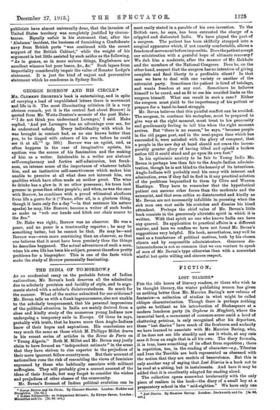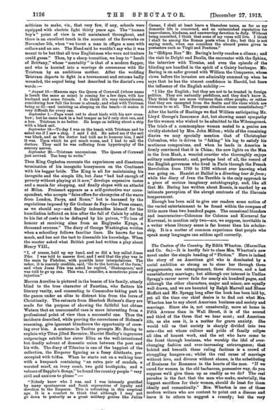LOST DIARIES.*
FOR the idle hours of literary readers, or those who wish to be thought literary, the winter publishing season has given us nothing better than Mr. Maurice Baring's new volume of fantasies—a collection of studies in what might be called oblique characterization. Though there is perhaps nothing quite as brilliant as his introduction of Shakespeare at a modern luncheon party (in Orpheus in. Mayfair), where the immortal bard, a monument of common-sense amid a herd of chattering preeieux, is only recognized after his departure, these "lost diaries" have much of the freshness and audacity we have learned to associate with Mr. Maurice Baring, who, if he does not see life steadily and see it whole, at any rate sees it from an angle that is all his own. The diary formula, it is true, loses something of its effect from repetition ; there is repetition, too, in the reading of character—e.g., Tiberius and Ivan the Terrible are both represented as obsessed with the notion that they are models of benevolence. But this is only another way of saying that Lost Diaries is a book not to be read at a sitting, but in instalments. And here it may be added that it is excellently adapted for reading aloud.
The collection opens somewhat irrelevantly with the only piece of realism in the book—the diary of a small boy at a preparatory school in the" mid-eighties." We have only one • Lost Diaries. By Maurice Baring. London: Duckworth and Co. [3o. 6d. net.]
criticism to make, viz., that very few, if any, schools were equipped with electric light thirty years ago. The "human boy's" point of view is well maintained throughout, and there is an excellent touch in the account of the fireworks on November Sth, when "we burnt a man in effigee a man with collars and an axe. The Head said he wouldn't say who it was meant to be but that all true Englishmen who were not trailers could guess." Then, by a sharp transition, we leap to "Iseult
of Brittany," whose " mentality " is that of a modern flapper, and who is hurried into a manage de conveyance with Sir
Tristram by an ambitious mother. After the wedding Tristram departs to fight in a tournament and returns badly wounded, the sequel being best described in the diarist's own words :—
"August 10.—Mamma says the Queen of Cornwall (whose name is Iseult the same as mine) is coming for a few days, with her husband and some friends. I do think it's very inconsiderate, considering how full the house is already; and what with Tristram being so ill—and insisting on sleeping on the beach—it makes it very difficult for every one.
September 1.—Papa went out to shoot birds with his new cross- bow ; but he came back in a bad temper as he'd only shot ono, and a hen. Tristram is no better. He keeps on talking about a ship with a black sail.
September 19.—To-day I was on the beach with Tristram and he asked me if I saw a ship. I said I did. He asked me if the sail was black, and as the doctor had told me to humour him, I said it was. 'Upon which he got much worse, and I had to call the doctors. They said he was suffering from hypertrophy of the sensory nerves.
September 20.—Tristram unconscious. The Queen of Cornwall just arrived. Too busy to write."
Then King Cophetust recounts the experiences and disastrous
termination of his incognito honeymoon on the Continent with his beggar bride. The King is all for maintaining his incognito and the simple life, but Jane "had bad enough of poverty without playing at it now," develops expensive tastes and a mania for shopping, and finally elopes with an attaché
at Milan. Froissart appears as a self-protective war corre- spondent, who accepts "faire offers for chronycles of the warre from London, Parys, and Rome," but is harassed by the regulations imposed by Sir Godmar de Fay—the Press censor, as we should say—and finally indemnifies himself for the humiliation inflicted on him after the fall of Calais by adding to his list of costs to be defrayed by his patron, "To loss of honour at receiving alms from an Englysshe Kynge, a thousand cronnes." The diary of George Washington written when a schoolboy follows familiar lines. He knows far too
much, and has not the tact to dissemble his knowledge. When the master asked what British poet had written a play about Henry VIII., "I, of course, held up my band, and so did a boy called Jonas Pike. I was told to answer first, and I said that the play was in the main by Fletcher, with possible later interpolations. The usher, it is scarcely credible, said, 'Go to the bottom of the form,' and when Jonas Pike was asked he replied, 'Shakespeare,' and was told to go up one. This was, I consider, a monstrous piece of injustice."
Marcus Aurelius is pictured in the bosom of his family, utterly blind to the true character of Faustina, who flatters his literary vanity, and consenting to Commodus taking part in the games under an alias to distract him from the lures of Christianity. The extracts from Sherlock Holmes's diary are made for the purpose of showing the faithful but obtuse Watson that an unsuccessful case is more interesting from a professional point of view than a successful one. Thus the incidents described, while proving the correctness of Holmes's reasoning, give ignorant blunderers the opportunity of crow- ing over him. A sentence in Tacitus prompts Mr. Baring to explain why Titus jilted Berenice; Harriet Shelley's ingenuous outpourings exhibit her sister Eliza as the well-intentioned but deadly solvent of domestic union between the poet and hie wife. The diary of Tiberius is one of the happiest of the
collection, the Emperor figuring as a fussy dilettante, pre- occupied with trifles. When be starts out on a walking tour with a knapsack containing "an extra pair of sandals, a worsted scarf, an ivory comb, two gold toothpicks, and a volume of Sappho's Songs," he found the country people "very civil and anxious to please"
"Nobody knew who I was, and I was intensely gratified by many spontaneous and frank expressions of loyalty and devotion to the Emperor. This is refreshing in this sceptical age. It is a comfort to think that although I may not go down to posterity as a great military genius like Julius Caesar, I shall at least leave a blameless name, as far as my domestic life is concerned, and an untarnished reputation for benevolence, kindness, and unswerving devotion to duty. Without being conceited, I think that some of my verse will live. I think I shall be among the Roman poets when I die; but this is not saying much, when one considers the absurd praise given to poetasters such as Virgil and Ponticus."
In " CEdipus Rex" Mr. Baring's levity reaches a climax ; and the visit to Delphi and Daulis, the encounter with the Sphinx, the interview with Tiresias, and even the episode of the blinding are handled in the spirit of a Gaiety burlesque. Mr. Baring is on safer ground with William the Conqueror, whose views before the invasion are admirably summed up when he says that he has the utmost confidence in Harold, but fears the influence of the English nobility :—
"I like the English; but they are not to be trusted in foreign politics. They are naturally perfidious, and they don't know it. They think they are more virtuous than other people; or rather that they are exempted from the faults and the vices which are common to us all. The European situation seems unsatisfactory."
After the battle of Hastings we find William anticipating Mr. Lloyd George's Insurance Act, but showing scant sympathy for the women who wished to be admitted to the Witenagemot. The trials of a commonplace woman mated to a genius are vividly sketched by Mrs. John Milton ; while of the remaining diaries we may specially mention that of Christopher Columbus, who is driven to "faking" his log to satisfy his mutinous companions, and when he lands in America is firmly convinced that it is China; the new lights on the Man in the Iron Mask, a wearied courtier who thoroughly enjoys solitary confinement ; and, perhaps best of all, the record of the English governess who lived in Paris through the French Revolution from 1789 to 1793 without ever knowing what
was going on. Hamlet at Balliol is a diverting tour de force ; while the diary of Ivan the Terrible is the only approach to a piece of serious imaginary autobiography, and, like all
that Mr. Baring has written about Russia, is marked by an intimate perception of the abrupt contrasts of the Slavonia temperament.
Enough has been said to give our readers some notion of the varied entertainment to be found within the compass of little more than two hundred pages. The occasional blunders and inaccuracies—Colonnus for Colonue and Kurneval for Kurvenal, to mention only two—are, we suppose, inevitable in a writer whose literary sense is far keener than his scholar- ship. It is a matter of common experience that people who speak many languages can seldom spell correctly.



































 Previous page
Previous page